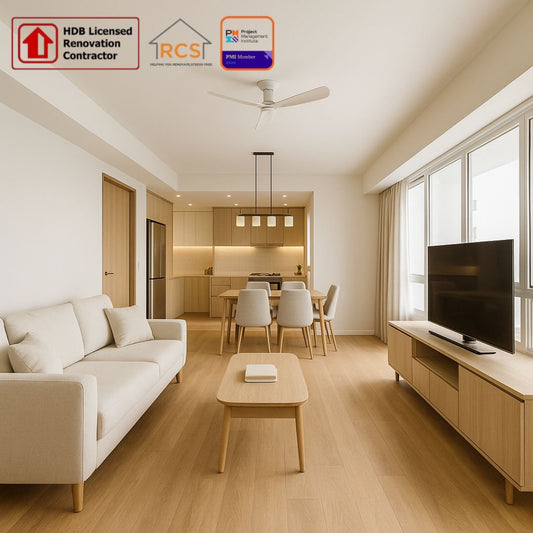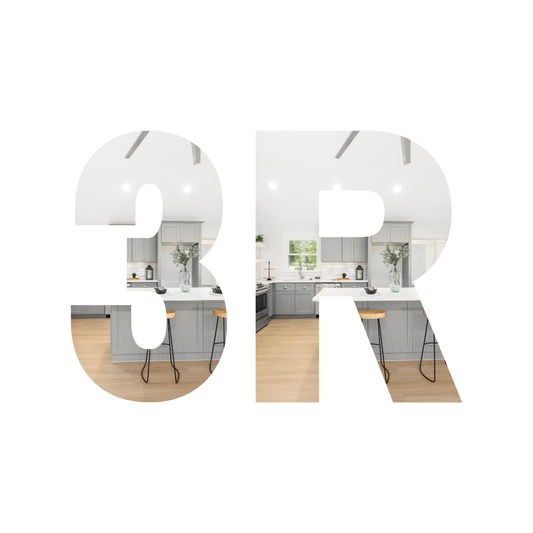Planning to buy property in Singapore requires a deep understanding of various aspects, from eligibility to renovation processes. This article provides comprehensive information about buying and renovating HDB flats and bungalows in Singapore, with step-by-step guidance to help you make the right property decisions.
Introduction: Understanding Singapore's Property Market
Singapore's property market offers various housing options, with HDB (Housing and Development Board) flats and bungalows being two main categories that often become the focus of buyers and investors. Property investment in Singapore involves significant financial commitment, so a thorough understanding of all related aspects is crucial.
HDB flats are the backbone of public housing in Singapore, providing affordable living options well-integrated into urban infrastructure. Meanwhile, bungalows represent the private property segment offering exclusivity, privacy, and more space.
Buying HDB Flats in Singapore
Eligibility Criteria for HDB Flat Purchase
Eligibility to buy an HDB flat is determined by several key factors:
Citizenship, Age, and Family Nucleus Requirements
To buy a new flat directly from HDB (Build-To-Order/BTO, Sale of Balance Flats/SBF, or Open Booking of Flats), at least one applicant must be a Singapore Citizen (SC). For purchasing HDB flats from the resale market, Singapore Permanent Residents (SPR) also have opportunities with certain conditions.
For family-based or couple schemes, the minimum age is generally 21 years. For single schemes (Single Singapore Citizen Scheme), the minimum age is 35 years, with some exceptions for orphans or single parents.
HDB requires applicants to form a recognized family nucleus, such as married couples, parents with children, or other special schemes. Renovating homes for families after purchase becomes an important step to create comfortable living spaces.
Income Ceiling
Monthly household income limits for various HDB schemes in 2025:
- 2-Room Flexi Flat (99-year lease): S$7,000
- 3-Room Flat: S$7,000 or S$14,000 (depending on the project)
- 4-Room or larger Flat: S$14,000
- Multi-generation families: S$21,000
- Singles buying new 2-Room Flexi flats: S$7,000
- Executive Condominium: S$16,000
There is no income ceiling for HDB resale flat purchases if buyers don't take CPF grants or loans from HDB.
Other Property Ownership Rules
Applicants who want to buy new HDB flats or resale flats with CPF grants/HDB loans cannot own other private properties. If they previously owned private property, they must have sold it at least 30 months before applying for an HFE letter.
For resale flat purchases without CPF grants/HDB loans, the private property divestment period is at least 15 months before the OTP date. If already owning an HDB flat, they must sell it within six months after collecting the keys to the new HDB flat.
HDB Flat Purchase Process
HDB Flat Eligibility (HFE) Letter
The first step before applying for an HDB flat is obtaining an HDB Flat Eligibility (HFE) letter. This document assesses the eligibility of potential buyers and explains the types and amounts of CPF grants and loan options available. Planning HDB renovation should ideally begin after obtaining the HFE letter.
Buying New HDB Flats (BTO, SBF, Open Booking)
The process of buying a new flat includes:
- Online Application: Through the HDB Flat Portal during the sales period.
- Ballot: HDB conducts a balloting process to determine the queue number for unit selection.
- Booking a Flat: Successful applicants are invited to choose a flat unit and pay the option fee.
- Signing the Lease Agreement: Done about nine months after booking the flat.
- Key Collection: Takes place after the flat is completed, with a waiting time of 2.5-5 years for BTO.
Buying HDB Resale Flats
The resale flat purchase process includes:
- Obtaining an HFE Letter: Required before a seller can provide an OTP.
- Option to Purchase (OTP): The seller provides an OTP after the buyer pays the Option Fee (maximum S$1,000).
- Request for Value: Submit a valuation request to HDB for S$120.
- Resale Application Submission: Buyer and seller submit applications through the HDB Resale Portal.
- Document Endorsement and Fee Payment: Endorsement of legal documents and payment of related fees.
- Completion Appointment: About eight weeks after HDB accepts the resale application.
HDB Flat Price Analysis
Latest BTO Flat Prices
BTO flat prices vary based on location, flat type, and category (Standard, Plus, Prime). Examples from February 2025:
| Project Name | Project Type | Flat Type | Price Range (Starting from) |
|---|---|---|---|
| Woodlands North Verge | Standard | 4-Room | S$365,000 |
| Stirling Horizon | Plus | 4-Room | S$554,000 |
| Tanjong Rhu Parc Front | Prime | 4-Room | S$548,000 |
Trends and Median Prices of Resale Flats
HDB resale flat prices increased by 1.6% in Q1 2025, marking the 23rd consecutive quarterly increase. Transaction volume reached 6,590 units, up 2.6% from the previous quarter.
Median resale flat prices in April 2025 (examples):
- Ang Mo Kio: 4-Room around S$782,500
- Queenstown: 4-Room around S$982,500
- Jurong West: 4-Room around S$551,000
The "million-dollar flat" phenomenon is becoming more common, with 364 units sold for ≥S$1 million in Q1 2025 (5.5% of total resale transactions).
HDB Flat Purchase Costs
Downpayment
Minimum downpayment for:
- HDB Loan: 20% of purchase price (can use CPF OA funds, or a combination of CPF OA and cash).
- Bank Loan: 25% of purchase price (minimum 5% cash, remainder can use CPF OA and/or cash).
Buyer's Stamp Duty (BSD) and Additional Buyer's Stamp Duty (ABSD)
BSD is progressive based on the purchase price or market value of the property:
- First S$180,000: 1%
- Next S$180,000: 2%
- Next S$640,000: 3%
- Next S$500,000: 4%
- Next S$1,500,000: 5%
- Amount above S$3,000,000: 6%
ABSD is charged based on citizenship profile and the number of residential properties owned. Budget renovation strategies are very relevant after allocating funds for purchase.
Legal Fees and Valuation Fees
Legal fees for lawyer services range from S$450 (HDB services) to S$1,600-S$2,500 (private lawyers). Valuation fee for resale flats is S$120 (including GST). Resale application fees are S$40 (1-Room/2-Room flats) or S$80 (3-Room or larger flats).
Buying Bungalows in Singapore
Bungalow Purchase Eligibility Criteria
Requirements for Singapore Citizens
Singapore Citizens (SC) have greater freedom in buying landed properties, including bungalows, without special approval from authorities like the Singapore Land Authority (SLA). Landed property renovation becomes a major consideration after purchase.
Strict Rules for Permanent Residents (PR) and Foreign Nationals
PRs and foreigners are categorized as "foreign persons" under the Residential Property Act. To buy a bungalow, they must obtain approval from the Land Dealings Approval Unit (LDAU) with these requirements:
- Must have been a Singapore PR for at least five years
- Must prove exceptional economic contribution to Singapore
Exceptions apply for landed property purchases in Sentosa Cove, with a faster approval process.
Bungalow Purchase Process
Key Steps
- Property Search: Through real estate agents, online property portals, or personal networks.
- Due Diligence: Checking legal aspects, physical condition, and compliance with URA and BCA regulations.
- Offer Submission and Negotiation: Submitting a price offer to the seller.
- Option to Purchase (OTP): Seller issues an OTP after the buyer pays the Option Fee (usually 1% of purchase price).
- Securing Financing: Arranging financing during the Option Period.
- Exercising the OTP: Paying the remaining deposit (total 5% or 10%).
- Engaging a Lawyer: Appointing a lawyer for the ownership transfer process.
- Stamp Duty Payment: Paying BSD and ABSD (if applicable).
- Transaction Completion: Paying the remaining purchase price and receiving the keys.
Importance of Due Diligence and Legal Aspects
Due diligence for bungalow purchases includes:
- Verifying compliance with URA and BCA guidelines
- Checking the Road Line Plan and Sewerage Information Plan
- Verifying LDAU approval status (for PRs/foreigners)
- Verifying land boundaries and ownership
- Identifying illegal renovations by previous owners
Bungalow Price Analysis
Price Ranges in Various Districts
Bungalow prices vary based on location, size, condition, age, and ownership status. Average price estimates (2025 data):
- Sentosa Cove: S$22.6-23 million (99-year leasehold)
- Bukit Timah (Districts 10 & 11): S$23.7-23.8 million
- Holland Village (District 10): S$42.3-43.4 million
- Novena (District 11): S$20.7-20.8 million
Good Class Bungalow Areas (GCBA) like Nassim Road, Dalvey Estate, and Cluny Park have very strict planning guidelines, with minimum land area requirements of 1,400 square meters.
Price Determining Factors
Key factors affecting bungalow prices include:
- Location: Proximity to the city center, top schools, public facilities, and neighborhood exclusivity
- Land Area: One of the biggest value drivers for landed properties
- Built-up Area: Total floor area of the building
- Property Age and Condition: Newer buildings or well-renovated ones usually command higher prices
- Ownership Status: Freehold properties generally cost more than leasehold properties
- Redevelopment Potential: Factors like underutilized plot ratio or possibility for Addition & Alteration (A&A)
Bungalow Purchase Costs
Downpayment, BSD, and ABSD for Private Property
Downpayment: For bungalow purchases, the main financing source is commercial bank loans. Banks typically require a minimum downpayment of 25% of the property purchase price, with at least 5% in cash and the remainder using CPF Ordinary Account funds (if eligible) and/or additional cash.
For a S$10 million bungalow, the 25% downpayment means S$2.5 million, with a minimum of S$500,000 in cash.
BSD follows the same progressive rates as for HDB flats. For a S$10 million property, the estimated BSD is about S$564,600.
ABSD becomes a very significant cost factor, especially if this isn't the buyer's first residential property. For example, if a Singapore Citizen buys a bungalow as their second property, a 20% ABSD will apply. For a S$10 million bungalow, this means an additional S$2 million cost.
Legal Fees, Valuation, and Other Potential Costs
Additional costs include:
- Legal Fees (Conveyancing Fees): S$2,500 to S$5,000 or higher
- Valuation Fee: S$163 to S$700 or more
- Property Agent Commission: Typically paid by the seller
- Property Inspection Fees: For older or complex properties
- LDAU Application Fee: S$1,220 per property (for PRs/foreigners)
- Bank-related Fees: Such as administrative or legal fees
Comprehensive Guide to Property Renovation in Singapore
HDB Flat Renovation: Rules and Detailed Procedures
General HDB Renovation Guidelines
To maintain harmony in dense HDB environments, HDB establishes strict rules regarding renovation:
Permitted Working Hours:
- General Renovation Work: Monday to Saturday, 9:00 AM to 6:00 PM
- Noisy Renovation Work: Monday to Friday, 9:00 AM to 5:00 PM only
- DIY Work by owners: Recommended between 7:00 AM and 10:30 PM, minimizing noise
Neighbor Notification: Before starting renovation, flat owners or contractors must notify neighboring units within a two-unit radius at least 3-5 days in advance. A "Notice of Renovation" must be clearly displayed in the lift lobby or common area near the renovated unit.
Flat Owner Responsibilities: Flat owners have full responsibility for all renovation work done in their units. This includes ensuring that appointed contractors comply with HDB guidelines and regulations. Violations can result in fines up to S$5,000 and other penalties.
Types of Work Allowed, Prohibited, and Requiring HDB Permission
HDB classifies renovation work into several categories based on its impact on building structure and permit requirements.
Work Requiring HDB Permission:
- Demolition or Modification of Walls (both structural and non-structural)
- Replacement or New Installation of Floor Finishes
- Work in Bathrooms and Toilets
- Installation or Replacement of Windows
- Relocation of Internal Doors
- Gas-related Work
- Installation of New Air Conditioner Units
Work Generally Not Requiring HDB Permission:
- Internal wall painting
- Installation of built-in furniture
- Minor electrical work
- Simple plumbing work
Work Strictly Prohibited by HDB:
- Damaging or modifying main structural elements
- Overloading floor structures beyond limits
- Plastering ceilings
- Changing external building appearance without HDB approval
Renovation Permit Application Process
The HDB renovation permit application process is electronic and centralized, involving active participation from contractors registered in the Directory of Renovation Contractors (DRC):
- Application Submission: Applications must be submitted electronically by the appointed DRC contractor through the HDB InfoWEB portal using the "Application for Renovation Permit via Electronic Transaction" (APEX) system.
- Required Documentation: Scaled floor plan showing existing conditions and proposed changes, details about renovation work, signed Acknowledgement Form, and additional technical drawings if needed.
- Approval Time: Generally targets processing time up to three weeks, but can be faster (3-7 working days) for simpler work.
- Permit Validity: For new HDB blocks (like BTO flats): three months; for existing blocks (like resale flats): one month; for window installation/replacement: two weeks.
Choosing HDB Registered Contractors (DRC) and CaseTrust Accreditation
HDB requires flat owners to use only contractors registered in the Directory of Renovation Contractors (DRC) for all renovation work in HDB flats. Finding reliable contractors is crucial for successful renovation.
Contractors registered in DRC are expected to understand and comply with all HDB technical and administrative guidelines. HDB implements a Demerit Points System (DPS) for DRC contractors.
Besides DRC registration, flat owners are highly encouraged to consider contractors with CaseTrust accreditation. CaseTrust-accredited contractors have undergone strict assessment and committed to good business practices and fair consumer policies.
HDB Renovation Cost Estimates
Renovation costs for HDB flats in Singapore vary greatly, influenced by flat size and type, whether it's a new (BTO) or resale unit, scope of work, and choice of materials and finishes.
General cost estimates based on flat type and scope of work (2025 market data):
| Flat Type | Scope of Work | Estimated Cost (BTO) | Estimated Cost (Resale) |
|---|---|---|---|
| 3-Room (60-65 sqm) | Light | S$15,000 - S$25,000 | S$20,000 - S$35,000 |
| 4-Room (90-100 sqm) | Medium | S$30,000 - S$45,000 | S$40,000 - S$60,000 |
| 5-Room (110-120 sqm) | Extensive | S$55,000 - S$70,000 | S$70,000 - S$100,000 |
Kitchens and bathrooms typically absorb the largest portions of renovation budgets. Kitchen renovation ideas can help optimize your spending in this important area.
Bungalow Renovation: Guidelines from URA and BCA
Development Control Guidelines (URA) for Landed Properties
Urban Redevelopment Authority (URA) establishes comprehensive Development Control Guidelines (DCG) for all types of landed properties in Singapore, including bungalows. Key aspects regulated in URA's DCG include:
- Land Use Zoning: Each area has specific land use designations
- Landed Property Categories: Different parameters for Detached (Bungalow), Semi-Detached, and Terrace House
- Building Setbacks: Minimum distances from property boundaries
- Building Height (Storey Height): Maximum allowed building height
- Site Coverage: Maximum percentage of land area that can be covered by buildings
- Gross Floor Area (GFA): Total floor area allowed based on Plot Ratio
For Good Class Bungalow Areas (GCBA), URA enforces stricter planning guidelines, including minimum land area requirements (typically 1,400 square meters) and lower site coverage restrictions.
Building Control Requirements (BCA) and Qualified Persons (QP) Involvement
After obtaining planning permission from URA (if required), technical and safety aspects of bungalow renovation are regulated by the Building and Construction Authority (BCA):
- Building Permits: Required for major renovation work involving structural changes
- Qualified Persons (QP) Involvement: For significant renovation work, owners must appoint QPs (registered Professional Architects or Structural Engineers)
- Building Standards and Safety: BCA has various codes of practice and technical standards
- Regular Inspections: BCA may conduct on-site inspections during the renovation process
- Certificate of Statutory Completion (CSC): Required after all renovation work is completed
Difference between Addition & Alteration (A&A) and Reconstruction
In landed property renovation context, it's important to understand the difference between A&A and Reconstruction work:
Addition & Alteration (A&A): Refers to modifications or additions to existing buildings where less than 50% of the existing building structure is retained. Examples include internal layout changes, small extensions, facade updates, or roof changes. A&A work generally requires permits from URA and BCA, but the process might be slightly simpler than full reconstruction.
Reconstruction: Occurs when more than 50% of the existing building structure is demolished and rebuilt. This is essentially rebuilding the property. Reconstruction triggers full compliance requirements with all latest applicable URA and BCA guidelines as if it were a new building. The permitting process is usually more complex and time-consuming.
Bungalow Renovation Cost Estimates
Bungalow renovation costs in Singapore vary greatly and are significantly higher than HDB flat or even condominium renovation. General cost estimates:
- Interior Renovation Only (Without Major Structural Changes): S$200,000 to S$500,000 or more
- Addition & Alteration (A&A) with Partial Structural Changes: S$500,000 to S$1.5 million or more
- Full Reconstruction: Basic construction costs for standard bungalows range from S$400 to S$600 per square foot of total building area. For luxury bungalows, costs can reach S$800 to S$1,200 per square foot or more.
Additional costs include:
- Demolition Costs: S$50,000 to S$150,000
- Professional Fees: Percentage of total project cost or fixed rates
- Permitting Costs: S$50,000 to S$100,000 or more
- Landscaping and Exterior Work: S$100,000 to S$500,000 or more
- High-End Furniture and Fixtures: S$500,000 to S$2 million or more
- Contingency Costs: Recommend allocating 10% to 20% of the total budget
Comparative Analysis and Investment Considerations
HDB vs Bungalow: Direct Comparison
A direct comparison between HDB flats and bungalows highlights fundamental differences in various aspects:
Lifestyle and Facilities
HDB: Offers communal living with easy access to public facilities like playgrounds, food centers, markets, and public transportation. Focus is on affordability and convenience for daily needs.
Bungalow: Provides maximum privacy, spacious indoor and outdoor areas (private gardens, swimming pools if available), and freedom for customized design. The lifestyle offered is more exclusive and luxurious.
Initial and Ongoing Ownership Costs
HDB: Much lower purchase price, smaller downpayment, and potential for government grants. Monthly maintenance costs (Service & Conservancy Charges/S&CC) are also relatively low.
Bungalow: Very high purchase price (millions to tens of millions of dollars). Downpayment, BSD, and ABSD (if applicable) will be a huge initial financial burden. Ongoing maintenance costs are also significant.
Investment Potential and Value Appreciation
HDB: Value appreciation tends to be stable and moderate. Good liquidity due to the active HDB resale market. However, HDBs have 99-year leases, meaning their value will decrease as the remaining lease shortens. Rental potential exists after MOP, with yields around 3-4%.
Bungalow: Long-term value appreciation potential can be very high, especially for freehold properties or those in premium locations. However, the bungalow market is less liquid than HDB or condominium markets.
Long-Term Implications of HDB vs Bungalow Ownership
The decision to own an HDB flat or bungalow carries fundamentally different long-term implications:
HDB Flats:
- Affordability and Accessibility: Remains the most affordable option for home ownership in Singapore
- Ownership Restrictions: HDB rules like MOP and ethnic quotas limit flexibility
- Lease Decay: All HDB flats have 99-year leases. As remaining lease decreases, property value may stagnate or decline
- Community and Facilities: Strong communal environment with easy access to public facilities
Bungalows:
- High Capital Appreciation Potential: Landed properties have significant long-term capital appreciation potential due to land scarcity
- High Ownership and Maintenance Costs: Requires substantial financial commitment
- Flexibility and Privacy: Offers unmatched levels of privacy, space, and customization flexibility
- Legacy Planning: Freehold bungalows are often considered good legacy assets for future generations
- Lower Liquidity: The bungalow market has lower liquidity compared to HDB or condominiums
Conclusion and Recommendations
Navigating Singapore's property market, for both HDB flats and bungalows, requires deep understanding of various aspects from eligibility and purchase processes to price analysis and renovation regulations.
Key Findings Summary
- HDB Flat Purchase: Strictly regulated by HDB with eligibility criteria including citizenship, age, family nucleus formation, income ceilings, and other property ownership rules.
- Bungalow Purchase: Very exclusive. Singapore Citizens generally have freedom to buy, but for PRs and foreigners, SLA approval is difficult to obtain.
- HDB Renovation: Strictly regulated by HDB to maintain safety and structural integrity. Owners must use HDB DRC contractors.
- Bungalow Renovation: Subject to URA (planning, GFA, setback, height) and BCA (building standards, safety) guidelines.
- 2025 Property Market: HDB resale market expected to experience more moderate price growth, while landed property market (including bungalows) predicted to remain stable in the high-end segment.
Recommendations for Potential Buyers and Renovators
Based on the analysis presented, here are some general recommendations:
Conduct Thorough Research and Solid Financial Planning:
- For HDB Buyers: Understand all HDB eligibility schemes and carefully calculate your income limits. Get the HFE letter well in advance.
- For Potential Bungalow Buyers: Prepare very large funds not just for the purchase price but also for downpayment, BSD, potential ABSD, legal fees, and renovation.
- For PRs/Foreigners Interested in Bungalows: Realize that the chance of getting SLA approval is very small. Consider alternatives like luxury condominiums.
Comply with All Purchase and Renovation Regulations:
- Never take shortcuts regarding permits or renovation guidelines, for both HDB and bungalows.
- For HDB renovation, always use HDB DRC contractors and consider CaseTrust-accredited ones for additional protection.
- For bungalow renovation, involve Qualified Persons (architects/engineers) from the beginning to ensure design and implementation comply with URA and BCA guidelines.
Consider Long-Term Implications:
- HDB Buyers: Remember the lease decay issue. If buying resale flats, pay attention to remaining lease.
- Bungalow Buyers: Think about long-term maintenance costs and property liquidity.
Utilize Official Information Sources and Professionals:
- Always refer to official websites of HDB, URA, BCA, SLA, and IRAS for the most up-to-date and accurate information.
- Don't hesitate to consult with professionals like trusted real estate agents, financial advisors, lawyers, and architects/contractors.
Remember that property purchase in Singapore is a significant financial decision. Taking time to understand all aspects will help ensure you make informed choices for your long-term satisfaction and financial well-being.



